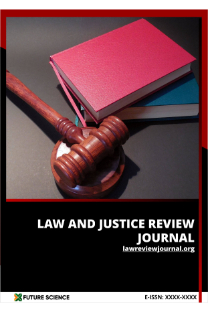THE DANCE OF CRIMINOLOGY WITH POLICY MAKERS AND WIDER PUBLIC
Kriminolojinin Politikacılarla ve Geniş Halk Kitlesiyle Dansı
___
Barlett, M. (2005). World Correctional Population Trends and Issues. In Toole, O. S. & Eyland, S.(Eds.). Corrections Criminology (pp.8-16). Sydney: Hawkins Press.Barnes, E. H. Teeters, K. N. (1960). New Horizons in Criminology. (3rd ed.). The US: Prentice - Hall, Inc.
Bbc News World. (2011). Egypt Revolution: Hosni Mobarak to go on trial in Cairo. Retrieved from: http://www.bbc.co.uk/news/world-middleeast-14328229
Beckett, K. Western, B. (2000). Criminal Policy in Transition. In Green, P. Rutherford, A. (Eds.), Criminal Policy in Transition. Portland: Hart Publishing.
Canter, D. Youngs, D. (2009). Investigative Psychology Offender Profiling and the Analysis of Criminal Action. Chichester: John Wiley & Sons Ltd.
Coyle, A. (2005). Understanding Prisons. Berkshire: Open University Press. Donnison, D. (1998). Creating Safer Society. In Finer, J. C. Nellis, M. (Eds.), Crime & Social Exclusion (pp.3-21). Oxford: Blackwell Publishers Ltd.
Faulkner, D. (2000). Policy and Practice in Modern Britain: Influences, Outcomes and Civil Society. In Green, P. Rutherford, A.(Eds.), Criminal Policy in Transition (pp.79-90). Portland: Hart Publishing.
Fulcher, J. Scott, J. (2007). Sociology. (3rd ed.). New York: Oxford University Press.
Guardian News. (2009). Government pledges £58m to recruiting top quality social workers following Baby P case. Retrieved from: http://www.guardian.co.uk/society/2009/may/06/baby-p-social-workers-recruitment- reform?INTCMP=SRCH).
Hale, C. (2005). The Politics of Law and Order , In Hale, C. Hayward, K. Wahidin, A. Wincup, E.(Eds.),Criminology (pp.427-446). New York: Oxford University Press.
Knepper, P. (2007). Criminology and Social Policy. London: Sage Publications Inc.
Kyvsgaard, B. (2003). The Criminal Career, The Danish Longitudinal Study. Cambridge: Cambridge University Press.
Melossi, D. (2008). Controlling Crime, Controlling Society. Malden: Policy Press.
Muncie, J. (1999). Youth and Crime: a critical introduction. London: Sage Publications. Pakes, F. Pakes, S. (2009). Criminal Psychology. Devon: Willan.
Political News. (n.d.). Political Corruption. Retrieved from: (http://www. u4.no/themespolitical-corruption/introduction.cfm
Poynting, S. (2008). Ethnic Minority Immigrants, Crime and State. In Anthony, T. Cunneen, C. (Eds.),The Critical Criminology Companion (pp.118-127). Sydney: Hawkins Press.
Reiner, R. (2006). Beyond Risk:A Lament for Social Democratic Criminology. In Newburn, T. Rock, P.(Eds.), The Politics of Crime Control (pp.7-49). New York: Oxford University Press.
Rutherford, A. (1996). Transforming Criminal Policy. Winchester: Waterside Press.
Simon, J. (2007). Governing Through Crime, New York: Oxford University Press. Spector, I. B. (2012). Detecting Corruption in Developing Countries. Virginia: Kumarian Press.
Sutherland, H. E. Cressey, R. D. Luckenbill, F. D. (1992). Principles of Criminology. (11th ed.). Marryland: Rowmann & Littlefield Pub, Inc.
Tonry, M. (2004). Punishment and Politics. Devon: Willian Publishing. Walters, R. (2003). Deviant Knowledge Criminology, politics and policy. Devon: Willian.
- ISSN: 1309-9485
- Yayın Aralığı: 2
- Başlangıç: 2010
- Yayıncı: Türkiye Adalet Akademisi
THE DANCE OF CRIMINOLOGY WITH POLICY MAKERS AND WIDER PUBLIC
LA VENTE D'UN ORDINATEUR PRÉINSTALLÉ: UNE PRATIQUE COMMERCIALE DÉLOYALE?
SUPPLEMENTARY PROTECTION CERTIFICATES IN EU LAW: A COMPENSATION MECHANISM AND TURKEY'S POSITION
THE CRITIQUE OF COMMON AGRICULTURAL POLICY OF THE EUROPEAN UNION
ABSORPTION CAPACITY OF THE EUROPEAN UNION: IS THERE STILL SPACE FOR NEW MEMBER STATES?
DRUG TRAFFICKING AS A TRANSNATIONAL CRIME*
IRAQ AND THE CONCEPT OF INTERNATIONAL JUDICIAL COOPERATION IN CRIMINAL MATTERS
PRIVILEGED PARTNERSHIP: AS AN ALTERNATIVE WAY TO THE TURKEY'S EUROPEAN UNION MEMBERSHIP BID*
